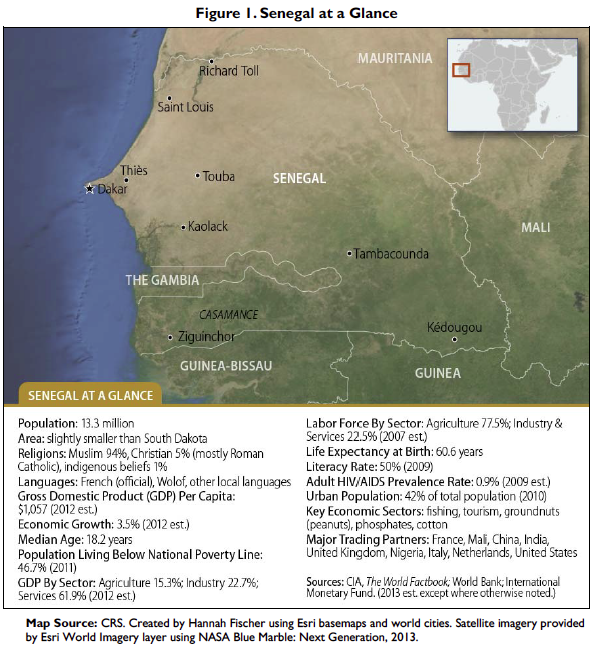By Liz Stratman and Devin Bailey
According to the Congressional Research Service, Senegal is viewed by the United States as an African democratic leader who is “an anchor of regional stability,” as well as “a partner in addressing developmental challenges and combating transnational security threats.” Despite struggles with poverty and a low-level separatist insurgency in Casamance (southern region), the country stands out in the efforts it makes toward progression in comparison to its neighbor, Mali.
Senegalese President Macky Sall was voted into office in 2012 after defeating former President Abdoulaye Wade. Wade had served since 2000; this would have been his third term. Out of concern for the country’s potential instability with Wade serving as president again, the Obama Administration appealed to Wade to withdraw his candidacy; however, he still ran for office, criticizing the “Western interference,” as he described it. By the end of the election, Sall had won and Wade became peaceful, so the country experienced a renewed sense of strength in its democratic institutions.
President Sall has focused on the following since his election:
- Reforming the civilian administration,
- Investigating former President Wade’s corrupt practices,
- Making another push for peace in Casamance.
Congress has shaped Senegal through its financial assistance. In the 2012 fiscal year, aid totaled $109.6 million, and Senegal received a five-year, $540 million Millennium Challenge Corporation Compact in 2009. At least $50 million is to be allocated to developmental aid in Senegal.
Freedom House rates Senegal as a free nation, and it has been one of the more successful post-colonial democratic transitions in Africa. As of 2012, Senegal is ranked 16th out of 52 African countries on the Ibrahim Scale of African Governance. However, there are still many obstacles for Senegal to overcome.
According to a 2011 report on human rights, the greatest problems for Senegal include:
- Limits on freedoms of speech, press and assembly;
- Inhumane treatment of prisoners and overcrowded prisons;
- Long detention of people for investigations and pretrials;
- Lack of an independent judiciary;
- Domestic violence, rape, sexual harassment and discrimination against women;
- Female genital mutilation and cutting (FGC),
- Child abuse, child marriage and child labor;
- Infanticide,
- Human trafficking,
- Reports of torture and physical abuse,
- Corruption.
Molly Melching, founder and executive director of Tostan, an NGO in Dakar that aims to empower African communities for positive social transformation and sustainable development based on a respect of human rights, is someone I consider a “cheetah” or leader devoted to bettering Senegal, specifically in relation to human rights issues. Melching first came to Senegal in 1974 as an exchange student and she has been making strides in human rights for over 30 years. Using a group of cultural specialists and community feedback, she helped develop an educational program that focuses on traditional Senegalese methods of learning, such as theater and dance. She engaged the communities by working with them in their own language, and it has seen much success. After working in Senegal for 15 years, she founded Tostan. The word tostan means “breakthrough” in the West African language of Wolof and the NGO has been true to its name. They currently have over 450 operations in 8 Sub-Saharan African countries.
According to a recent interview with Melching, the human rights activist has strongly encouraged the abandonment of FGC and child marriage, and she doesn’t doubt the country’s sincerity. Melching expects to see a measurable results from the movement to completely abandon FGC by 2020. Since Febuary 14, 1998, over 5,400 villages in Senegal have agreed to abandon both FGC and forced marriage. The government of Senegal has agreed to work to Tostan to end genital cutting outright by 2015. Not only has Tostan made great strides in Senegal, several other African countries have agreed to stop FGC as well. Many communities in Guinea, Gambia, Guinea Bissau, Mauritania, Djibouti, and Somalia have publicly denounced genital mutilation because of Tostan’s movement.
When asked how Tostan will continue to promote FGC abandonment, Melching responded by saying:
“…When people receive good information, they understand. We thus will continue to implement our basic three-year education program. It is a participatory education program that provides the information people need to make such decisions. Today, the only obstacle we are facing in the means that will make it possible to implement the program in all the places where communities request it.”
Melching and Tostan are positively impacting Senegal through educational programs like the Community Empowerment Program, where participants learn about health, education, environment, governance and economic growth. FGC and child marriage are major points of discussion. Additionally, Tostan has also achieved success in the areas of economic growth, environmental sustainability, governance, and health. They were awarded the Conrad N. Hilton Humanitarian Prize in 2007 for “significant contributions to the alleviation of human suffering.”
According to Tostan’s site, their work hasn’t gone unnoticed. Take education, for example. Last year, the NGO helped enroll 79 children in school in Mali. They also helped Senegal enroll 2,768 children in school.
Sub-Saharan Africa, Senegal in specific, will still experience a number of obstacles related to poverty despite their gradual progress in the right direction. According to an article from the Center for Global Development, the future of Africa is in the hands of the communities, “…the decisions they make, the priorities they set, and the institutions they establish.” Since the mid-1990s, the country has been getting stronger, promising a lot for the future. But they will continue to face challenges like an obligation to repay debt from past leadership, according to UN’s article on poverty. Senegal has been making great strides towards success and with the help of Tostan and the Senegalese themselves, their goals are seeming more realistic every day.
Below I have included some links containing information on Senegal’s recent developments.
Senegal 2012 Presidential Elections: Democracy on High Alert








